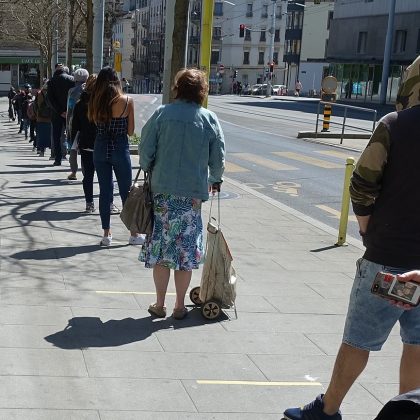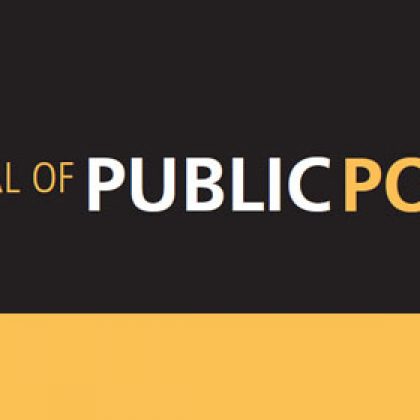New to Cambridge in 2024: Finance and Society
Cambridge University Press is pleased to announce that it will publish Finance and Society from January 2024, in partnership with the Finance and Society Network.

Cambridge University Press is pleased to announce that it will publish Finance and Society from January 2024, in partnership with the Finance and Society Network.

The Holy Grail of corporate finance is a theory that explains the capital structure behavior of real-world firms. It’s been 63 years since Modigliani and Miller’s (1958, MM) landmark paper and we still do not have a model that explains even the broad-brush features of observed capital structures.

Firstly, for anyone new to the journal can you briefly explain the journal’s mission and scope? The Journal of the History of Economic Thought (JHET) is the journal of the History of Economics Society and it promotes interest in and inquiry into the history of economics and related parts of intellectual history, facilitate communication and discourse among scholars and disseminate knowledge about the history of economics.…

In April 2021, the Journal of Financial and Quantitative Analysis hosted a symposium for finance research related to the Covid-19 Pandemic.…

Originally posted on the Society for Cost Benefit-Analysis On Balance blog In Volume 11 of The Journal of Benefit-Cost Analysis, Thunström, Newbold, Finnoff, Ashworth, and Shogren presented their findings on the national benefits and costs of physical (or social) distancing measures.…

Gender discrimination manifests in many ways, but in some countries, a long tradition of preference for sons over daughters has merged with recent demographic changes to produce unnaturally skewed sex ratios.…

Launching the National Institute Economic Review at 62 years old! We are, of course, still living in the grip of a Covid pandemic that is neither well understood nor under control.…

In the last decade or two, the economics of religion has become a full-fledged subfield in economics. Economists (and social scientists of all stripes) who study religion are interested in the many ways religion affects decision-making via politics, education, persecution, technology diffusion, violence, and much more.…

The protection of tropical forests globally is indispensable for significantly increasing climate ambition in line with Paris Agreement goals as illustrated by a tremendous return on climate investment, according to our new article in the journal Global Sustainability.…

The novel coronavirus, SARS-CoV-2, was declared a pandemic by the WHO in March 2020. Around this time, many states and local governments in the United States declared states of emergencies and adopted policies aimed at reducing the frequency of physical contacts between people—social or physical distancing measures—in an attempt to stop the spread of the virus.…

Tables are different from graphs and charts. Charts are meant to present a quick, visual representation of data. But tables are drill-downs, an outlay of all the data down to their exact values or estimates.…

In July 2016, European citizens were told that Manuel Barroso, former President of the European Commission, was leaving office to join the famous American investment bank, Goldman Sachs.…

COVID-19 has placed the world on an economic rollercoaster unlike anything seen for generations. As the reality that COVID-19 and its effects will likely be with us for years to come, people and societies around the world long for a “return to normal”. …

The global financial system is a crucial part of the modern economy, directing financial capital efficiently and effectively to where it is most needed to create prosperity. …

To better manage our ecosystems, we must first improve our understanding of their value. Currently this understanding is limited since many ‘services’ that are provided to us by the environment are not reflected in the market.…

In our recent article, Paula Sheppard and I tested the assumptions of life history theory, which is commonly used in evolutionary anthropology and related disciplines.…

From time to time, until the crisis has passed, the HEPL blog series authors will be given the opportunity to provide short updates on their country/region’s continuing response to this worldwide catastrophe and their further reflections on those responses.…

On June 30th the Higher Education website initially launched with a small selection of 80 online textbooks, with more titles due to be added throughout the following months.…

Higher Education from Cambridge University Press is our new online textbook website, launched in August 2020. In recent months Cambridge University Press has introduced a new set of strategies to support changing teaching and learning needs as higher education institutions prepare for a more digitally driven future in the wake of pandemic.…

The COVID-19 crisis is an unprecedented one in terms of its reach and pervasiveness, and it exposed the vulnerabilities of the global social, political, and economic system. That said, its impact on countries has been uneven and this unevenness depended heavily on the position countries were in immediately prior to the crisis. In Turkey, the key issue of youth un/employment emerged as one of the long-lasting ones since it was a major challenge before the crisis. Policy-making emerged as another key issue as the ability to generate long-term planning escaped Turkey and countries alike for a while. Regardless of when we will get past the pandemic, the post-COVID-19 world will be an extremely difficult one.

Let’s face it – stepping (sitting) in front of a camera has become a staple component of working from home during the global pandemic.…

HEPL blog series: Country Responses to the Covid19 Pandemic Quebec’s response to the coronavirus pandemic Greg Marchildon [1] [2] Amélie Quesnel-Vallée [2] [3] Madeline King [2] Antonina Maltsev [2] [1] Institute of Health Policy, Management and Evaluation, University of Toronto [2] North American Observatory on Health Systems and Policies [3] McGill Observatory on Health and Social Services Reforms, Department of Sociology and Department of Epidemiology, Biostatistics and Occupational Health, McGill University Background and Scope Quebec has been the hardest hit jurisdiction in Canada yet among the first provinces to begin reopening.…

From time to time, until the crisis has passed, the HEPL blog series authors will be given the opportunity to provide short updates on their country/region’s continuing response to this worldwide catastrophe and their further reflections on those responses.…

HEPL blog series: Country Responses to the Covid19 Pandemic Albania’s response to the coronavirus pandemic Andi Hoxhaj, University of Warwick The coronavirus pandemic officially started in Albania on 8th of March when the Ministry of Health announced the country’s first cases – a father and son who had travelled from Italy to Albania.…

HEPL blog series: Country Responses to the Covid19 Pandemic Poland’s response to the Coronavirus Pandemic Michał Zabdyr-Jamróz, Iwona Kowalska-Bobko As of 8th May Poland has reported a total of 15,200 confirmed COVID-19 cases; 5,184 recoveries; 9,260 active cases (2% being serious or critical) and 756 deaths associated with the disease (20 deaths per 1 million inhabitants).…

From time to time, until the crisis has passed, the HEPL blog series authors will be given the opportunity to provide short updates on their country/region’s continuing response to this worldwide catastrophe and their further reflections on those responses.…

HEPL blog series: Country Responses to the Covid19 Pandemic Ontario’s response to the coronavirus pandemic Greg Marchildon[1][2] Sara Allin[1][2] Karen Born[1] [1] Institute of Health Policy, Management and Evaluation, University of Toronto [2] North American Observatory on Health Systems and Policies Background and Scope With 39% of Canada’s population (14.7 million residents), Ontario is home to the country’s largest city, Toronto, and its national capital of Ottawa.…

HEPL blog series: Country Responses to the Covid19 Pandemic Malaysia’s Response to the Coronavirus Pandemic YingYing Yew University of Oviedo, Faculty of Medicine and Health Sciences, Unit for Research in Emergency & Disaster, Campus del Cristo, E-33006, Oviedo, Spain On the 23rd January 2020, the Singapore Immigration Checkpoints Authority alerted its counterpart neighbour regarding foreign visitors that tested positive for COVID-19 and managed to get across to the Malaysian border.…

HEPL blog series: Country Responses to the Covid19 Pandemic Jordan’s Response to the Coronavirus Pandemic Elise Tancoigne University of Geneva Jordan reported 453 cases and 8 deaths from COVID-19 as of April 30, among the lowest number in the world.…

From time to time, until the crisis has passed, the HEPL blog series authors will be given the opportunity to provide short updates on their country/region’s continuing response to this worldwide catastrophe and their further reflections on those responses.…

From time to time, until the crisis has passed, the HEPL blog series authors will be given the opportunity to provide short updates on their country/region’s continuing response to this worldwide catastrophe and their further reflections on those responses.…

From time to time, until the crisis has passed, the HEPL blog series authors will be given the opportunity to provide short updates on their country/region’s continuing response to this worldwide catastrophe and their further reflections on those responses.…

HEPL blog series: Country Responses to the Covid19 Pandemic Brazil’s response to the coronavirus pandemic Elize Massard da Fonseca, São Paulo School of Business Administration, Getulio Vargas Foundation (FGV) Francisco Inácio Bastos, Oswaldo Cruz Foundation (Fiocruz) Brazil is known for its successful control of communicable infectious diseases, such as HIV/AIDS and hepatitis (Barreto et al.…

From time to time, until the crisis has passed, the HEPL blog series authors will be given the opportunity to provide short updates on their country/region’s continuing response to this worldwide catastrophe and their further reflections on those responses.…

From time to time, until the crisis has passed, the HEPL blog series authors will be given the opportunity to provide short updates on their country/region’s continuing response to this worldwide catastrophe and their further reflections on those responses.…

HEPL blog series: Country Responses to the Covid19 Pandemic Mexico’s Response to the Coronavirus Pandemic Gabriel Moreno-Esparza Northumbria University Mexico was the epicentre of the A/H1N1 influenza (swine flu) pandemic of 2009.…

HEPL blog series: Country Responses to the Covid19 Pandemic Kerala’s Response to the Coronavirus Pandemic Hafiz Shahul Kerala’s model of healthcare is well known globally for producing good health at low cost.…

From time to time, until the crisis has passed, the HEPL blog series authors will be given the opportunity to provide short updates on their country/region’s continuing response to this worldwide catastrophe and their further reflections on those responses.…

From time to time, until the crisis has passed, the HEPL blog series authors will be given the opportunity to provide short updates on their country/region’s continuing response to this worldwide catastrophe and their further reflections on those responses.…

From time to time, until the crisis has passed, the HEPL blog series authors will be given the opportunity to provide short updates on their country/region’s continuing response to this worldwide catastrophe and their further reflections on those responses.…

HEPL blog series: Country Responses to the Covid19 Pandemic Austria’s Response to the Coronavirus Pandemic – a second perspective (read the alternative report here) Thomas Czypionka, Institute for Advanced Studies Vienna (IHS), Austria and London School of Economics, UK Miriam Reiss, Institute for Advanced Studies Vienna Isabel Pham, Institute for Advanced Studies Vienna Despite its fragmented healthcare system, strong federalism and relatively poor public health capacity, Austria has so far fared surprisingly well in the current crisis.…

From time to time, until the crisis has passed, the HEPL blog series authors will be given the opportunity to provide short updates on their country/region’s continuing response to this worldwide catastrophe and their further reflections on those responses.…

HEPL blog series: Country Responses to the Covid19 Pandemic Norway’s response to the coronavirus pandemic Terje P. Hagen and Bjørn Hofmann The first COVID-19 infected patient was identified on February 26 and was a female returning from China.…

HEPL blog series: Country Responses to the Covid19 Pandemic China’s Response to the Coronavirus Pandemic Xiaolin Wei Dalla Lana School of Public Health, University of Toronto, Toronto, Canada xiaolin.wei@utoronto.ca…

From time to time, until the crisis has passed, the HEPL blog series authors will be given the opportunity to provide short updates on their country/region’s continuing response to this worldwide catastrophe and their further reflections on those responses.…

From time to time, until the crisis has passed, the HEPL blog series authors will be given the opportunity to provide short updates on their country/region’s continuing response to this worldwide catastrophe and their further reflections on those responses.…

From time to time, until the crisis has passed, the HEPL blog series authors will be given the opportunity to provide short updates on their country/region’s continuing response to this worldwide catastrophe and their further reflections on those responses.…

From time to time, until the crisis has passed, the HEPL blog series authors will be given the opportunity to provide short updates on their country/region’s continuing response to this worldwide catastrophe and their further reflections on those responses.…

HEPL blog series: Country Responses to the Covid19 Pandemic Greece’s response to the coronavirus pandemic Aris Angelis1, Ilias Kyriopoulos1, Irene Papanicolas1,2, Sotiris Vandoros2,3 1 Department of Health Policy, London School of Economics and Political Science, London, UK 2 Harvard T.H.…

From time to time, until the crisis has passed, the HEPL blog series authors will be given the opportunity to provide short updates on their country/region’s continuing response to this worldwide catastrophe and their further reflections on those responses.…

From time to time, until the crisis has passed, the HEPL blog series authors will be given the opportunity to provide short updates on their country/region’s continuing response to this worldwide catastrophe and their further reflections on those responses.…

From time to time, until the crisis has passed, the HEPL blog series authors will be given the opportunity to provide short updates on their country/region’s continuing response to this worldwide catastrophe and their further reflections on those responses.…

From time to time, until the crisis has passed, the HEPL blog series authors will be given the opportunity to provide short updates on their country/region’s continuing response to this worldwide catastrophe and their further reflections on those responses.…

From time to time, until the crisis has passed, the HEPL blog series authors will be given the opportunity to provide short updates on their country/region’s continuing response to this worldwide catastrophe and their further reflections on those responses.…

From time to time, until the crisis has passed, the HEPL blog series authors will be given the opportunity to provide short updates on their country/region’s continuing response to this worldwide catastrophe and their further reflections on those responses.…

From time to time, until the crisis has passed, the HEPL blog series authors will be given the opportunity to provide short updates on their country/region’s continuing response to this worldwide catastrophe and their further reflections on those responses.…

From time to time, until the crisis has passed, the HEPL blog series authors will be given the opportunity to provide short updates on their country/region’s continuing response to this worldwide catastrophe and their further reflections on those responses.…

From time to time, until the crisis has passed, the HEPL blog series authors will be given the opportunity to provide short updates on their country/region’s continuing response to this worldwide catastrophe and their further reflections on those responses.…

From time to time, until the crisis has passed, the HEPL blog series authors will be given the opportunity to provide short updates on their country/region’s continuing response to this worldwide catastrophe and their further reflections on those responses.…

From time to time, until the crisis has passed, the HEPL blog series authors will be given the opportunity to provide short updates on their country/region’s continuing response to this worldwide catastrophe and their further reflections on those responses.…

From time to time, until the crisis has passed, the HEPL blog series authors will be given the opportunity to provide short updates on their country/region’s continuing response to this worldwide catastrophe and their further reflections on those responses.…

From time to time, until the crisis has passed, the HEPL blog series authors will be given the opportunity to provide short updates on their country/region’s continuing response to this worldwide catastrophe and their further reflections on those responses.…

From time to time, until the crisis has passed, the HEPL blog series authors will be given the opportunity to provide short updates on their country/region’s continuing response to this worldwide catastrophe and their further reflections on those responses.…

From time to time, until the crisis has passed, the HEPL blog series authors will be given the opportunity to provide short updates on their country/region’s continuing response to this worldwide catastrophe and their further reflections on those responses.…

From time to time, until the crisis has passed, the HEPL blog series authors will be given the opportunity to provide short updates on their country/region’s continuing response to this worldwide catastrophe and their further reflections on those responses.…

From time to time, until the crisis has passed, the HEPL blog series authors will be given the opportunity to provide short updates on their country/region’s continuing response to this worldwide catastrophe and their further reflections on those responses.…

From time to time, until the crisis has passed, the HEPL blog series authors will be given the opportunity to provide short updates on their country/region’s continuing response to this worldwide catastrophe and their further reflections on those responses.…

From time to time, until the crisis has passed, the HEPL blog series authors will be given the opportunity to provide short updates on their country/region’s continuing response to this worldwide catastrophe and their further reflections on those responses.…

From time to time, until the crisis has passed, the HEPL blog series authors will be given the opportunity to provide short updates on their country/region’s continuing response to this worldwide catastrophe and their further reflections on those responses.…

From time to time, until the crisis has passed, the HEPL blog series authors will be given the opportunity to provide short updates on their country/region’s continuing response to this worldwide catastrophe and their further reflections on those responses.…

HEPL blog series: Country Responses to the Covid19 Pandemic Denmark’s Response to the Coronavirus Pandemic The first Danish COVID-19 patient was diagnosed on February 27.…

Many of us are discovering that working at home for a long stretch can be difficult. Staying productive and motivated is a challenge, and it is not always easy to find a routine to keep things running smoothly.…

About the author: Edward B. Barbier is a University Distinguished Professor in the Department of Economics, Colorado State University and a Senior Scholar in the School of Global Environmental Sustainability.…

In the past three decades, credit rating agencies have been in the limelight on more than one occasion, and not in a good way.…

This special issue of Business History Review uses medieval, 19th century and 20th century examples to show that the union of entrepreneurship and philanthropy has a long history.

Today almost every adult in Sweden has a digital BankID, issued by banks for the purpose of ensuring safe payments. However, a BankID is also a pre¬requisite for contacts with for example municipal schools, and the public healthcare system.…

Co-creation is not a new idea. For years companies have been seeking advice from their customers about how they can improve their products and services, either by asking directly, by quietly listening, or by learning from data.…

When did Europe first forge ahead of China in terms of productivity and living standards? European economic historians have traditionally assumed that this divergence had already occurred by the sixteenth century or perhaps even earlier.…

Women's empowerment is now an established feature of the debate at the WTO. Over the years, the WTO has worked to further strengthen the role of trade in empowering women; to assess the impact of international trade on women's economic development; to make trade as inclusive as possible and thus to contribute to the implementation of the United Nations Sustainable Development Goals.

A new book containing all the key results from WTO Ministerial Conferences since the organization was established in 1995 was unveiled at the WTO on 18 July. Spanning 11 Ministerial Conferences held between 1996 and 2017, “WTO Ministerial Conferences: Key Outcomes” includes Ministerial Decisions and Declarations as well as Conference Chairpersons’ statements.

What do we mean when we talk about “scarcity”? Is it an absolute or relative condition? Observers of the 1959 Cuban Revolution have long relied on the category of scarcity to advance a variety of arguments.…

The title “The Case of the Catalans Consider’d” was the name used by European chancellors early in the 18th century to refer to the debates and arrangements regarding the political destiny of the Principality of Catalonia in the context of the Peace of Utrecht (1712-1714), the agreement that ended the War of the Spanish Succession.…

Patients warned about the personal health risks of misusing medicine were almost twice as likely to heed the advice and take and it correctly, a new study has found.…

A recent study by RAND Corporation researchers examined the average amount of police spending on crimes for each state. Averaging the results across all states and considering where people live, the cost to respond to various crimes

Africa’s future is urban. By 2050, the majority of Africans will live in cities, transforming its societies and economies. Yet very little is known about the impact this demographic shift will have on residents and political systems.…

The International Arbitration Club of New York (IACNY) announced today that Simon Batifort and J. Benton Heath are the recipients of the 2019 Smit-Lowenfeld Prize for the best article in the field of international arbitration. The prize is being awarded for the article, “The New Debate on the Interpretation of MFN Clauses in Investment Treaties: Putting the Brakes on Multilateralization”, which was published in the American Journal of International Law (Vol. III No. 4).

Summary: Open science enhances the credibility of research, which benefits everyone; scientists who invest in its practices can also expect personal benefits.…

We have all heard at some point about the crisis we are facing when it comes to financial planning for retirement, where people are not saving enough for retirement.…

Sven Steinmo states in his book Taxation and Democracy, “Governments need money. Modern Governments need lots of money.” This is no less true today than it was twenty-five years ago when he wrote it.…

Author Belal Baaquie discusses his new book: Quantum Field Theory for Economics and Finance: "Quantum field theory (QFT) has been my primary domain of research. I was inspired to look beyond its applications in physics by the work of K. G. Wilson, who applied QFT to the classical phenomenon of phase transitions. I was convinced that uncertainty in the social sciences could also be similarly modeled by QFT".

People talk a lot about segregation. Every week it seems that news reports or some new academic finding shows that segregation is related to some salient outcome. …

Have consumers actually benefitted from electric deregulation? Almost four decades ago, millions of businesses and households were sold on the concept of deregulation.…

A seismic shift is going on in finance still largely unnoticed by the public. People and institutions are increasingly investing their money into index tracker funds instead of actively managed mutual funds.…

Since the early 2000s successive Australian governments have required single parents with school age children who are in receipt of income support payments to at a minimum engage in some form of planning to return to paid work or part-time paid work or education/training.…

This post by R. Michael Alvarez originally appeared on PS:Now on April 10, 2018. Research transparency and replication are important issues today in the quantitative social sciences.…

The Sicilian mafia is arguably one of the most infamous institutions in the Western world. After its first appearance in Sicily in the 1870s it soon infiltrated the economic and political spheres of Italy and of the United States and has, at times, been considered a serious threat to the rule of law in both countries.…

Now that the new academic year has arrived, many Ph.D. students will be going on the job market for the first time.…

A new study published in MRS Energy & Sustainability investigates why so many of these American battery materials startups are failing under the current venture capital funding model.

With North Korea in the news, we would like to call attention to the range of research the Journal of East Asian Studies has published on the country.…

Sean Vanatta’s article Citibank, Credit Cards, and the Local Politics of National Consumer Finance, 1968–1991, published in Business History Review, is the winner of the 2016 Henrietta Larson Article Award.…